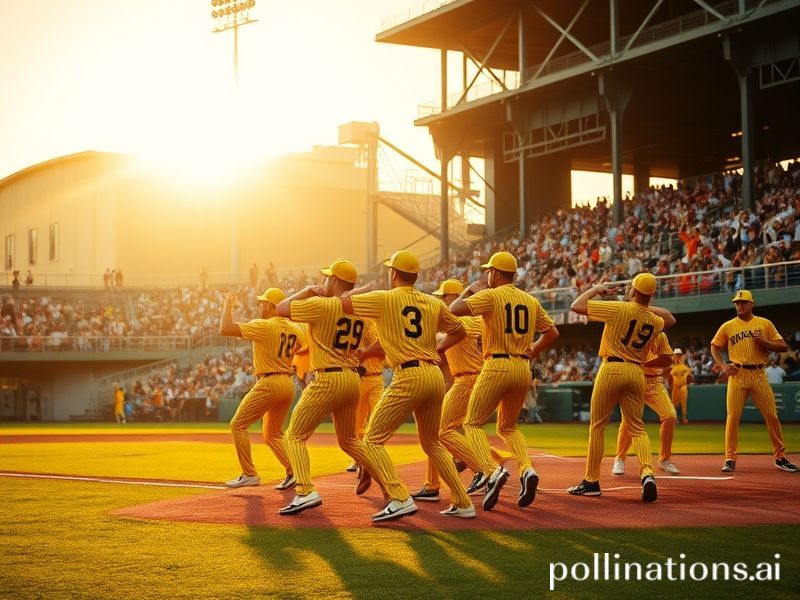Global Banana Republic: How One Silly Baseball Team Became the World’s Last Exportable Joy
Bananas in the Anthropocene: A Fruit That Thinks It’s a Baseball Team
For a planet currently busy stockpiling canned beans and iodine tablets, it is oddly reassuring to watch 7,000 Georgians—actual Georgians, not the Eurasian variety—lose their collective minds over a yellow-clad circus that calls itself the Savannah Bananas. From the outside, the spectacle resembles a fever dream cooked up by a focus group of caffeinated kindergarteners: batters in kilts, pitchers on stilts, and a mascot named Split whose sole purpose is to remind adults that their student-loan balances are higher than their serotonin levels. Yet, in an age when “global pastime” increasingly means doom-scrolling through war crimes and crypto scams, the Bananas have improbably become a soft-power export—an American absurdist comedy that speaks fluent TikTok and travels as smoothly as contraband uranium.
The Bananas’ 2024 “World Tour” (a phrase once reserved for the Beatles, now applied to grown men hitting grapefruit with pool noodles) has already sold out ballparks in Auckland, Seoul, and a temporarily repurposed bullring in Madrid. Ticket prices rival Champions League fixtures, proving that irony, like oil, is a commodity with spot pricing. Foreign audiences arrive expecting quaint Americana and leave humming “Take Me Out to the Ball Game” in phonetic English, slightly shocked that the only thing separating this from a Monty Python sketch is the lack of a Ministry of Silly Walks.
International broadcasters—desperate for non-apocalyptic content—have queued up like Soviet breadlines. Japan’s NHK dispatched a crew to film a nine-inning game played entirely in reverse, convinced it might unlock the secret to reclaiming lost decades of economic optimism. Meanwhile, German state television confirmed that the Bananas’ refusal to keep score aligns suspiciously well with the nation’s post-war commitment to historical ambiguity. Somewhere in Brussels, an EU working group is drafting a 400-page directive on the permissible decibel level of walk-up music, lest “Baby Shark” undermine continental dignity.
The geopolitical fallout is deliciously unintended. China’s Ministry of Culture issued a stern warning that synchronized dancing in banana suits could “corrupt socialist values,” then quietly booked the team for a three-game set in Shenzhen because, well, the export market for rare-earth metals is drying up and ticket revenue spends the same. Cuba, ever the master of revolutionary theater, countered with a state-sponsored squad called the Havana Plátanos, whose players must recite José Martí poetry between innings, making the sport feel like an SAT prep course with occasional bunts.
Back in Washington, senators who last agreed on anything during the Gulf War have now co-sponsored the Banana Diplomacy Act, proposing to replace predator drones with exploding confetti cannons. Analysts calculate the savings at $3.7 billion per fiscal year, though they concede confetti is harder to track on radar. The Pentagon, not known for its sense of humor, is studying whether synchronized conga lines can destabilize enemy morale faster than sanctions, a strategy codenamed “Operation Yellow Peril.”
Of course, the moment something becomes universally beloved, humanity does what it does best: weaponizes it. Rumors swirl that the next expansion franchise will be bankrolled by a Saudi sovereign-wealth fund, rebranding the sport as “Banana Ball: Presented by Aramco.” Expect carbon-neutral concessions—biodegradable peanuts, oat-milk Cracker Jack—and a halftime drone show spelling “Vision 2030” in flaming Arabic calligraphy. Qatar has already floated a winter league in air-conditioned domes, because nothing says “baseball tradition” like 68°F artificial turf in the desert.
Still, beneath the slapstick lies a melancholy truth. As glaciers calve and supply chains snap, we have collectively decided that the safest place to store our dwindling optimism is inside a yellow polyester costume. The Savannah Bananas are not merely exporting baseball; they are exporting the illusion that rules still exist, that grown-ups can play dress-up without drone strikes, that joy itself is not yet on the endangered-species list. The rest of the world, exhausted by its own headlines, has gratefully accepted the shipment.
And so, somewhere tonight, a Dutch teenager will livestream herself crying happy tears as a dancing banana pretends to eject a home-run hitter via cannon, and for three merciful hours the algorithm will forget to recommend footage of melting permafrost. History may not remember the final score—history may not even remember baseball—but it will note that when everything else went bananas, humanity briefly chose to go with them.







